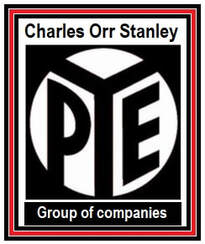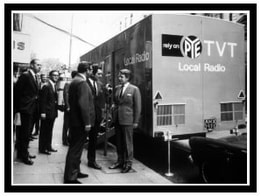|
Prince Charles explains 'pebble theatre'.
|
PEBBLE
|
|
Don Pierson [right] explains how a young Prince Charles made a request to join the Radio London fan club. |
|
|
Prince Charles explains 'pebble theatre'.
|
PEBBLE
|
|
Don Pierson [right] explains how a young Prince Charles made a request to join the Radio London fan club. |
|
|
[This is a revised and extracted text from the previous editorial published on 10/5/2020. Our purpose is to separate and then expand parallel tracks about Aodogán O'Rahilly; Allan James Crawford; Charles Orr Stanley and Ian Cowper Ross. Part 1c reveals the motivation behind the actions of Charles Orr Stanley and his son John Stanley. After they have been expanded, these parallel tracks will be joined to one theme in the book 'Dial 999 for Caroline'.]  As we previously noted many times in earlier editions of this Blog, Charles Orr Stanley and his son John Stanley were the ultra-secret movers and shakers behind the creation of Radio Caroline. But because of the PYE government contracts, the PYE involvement in Radio Caroline had to be kept quiet. PYE had no interest in running and operating stations, it was in the business of selling "packaged" radio and television stations to any operator, anywhere in the world who wanted to start a broadcasting station.  These "packaged" radio and television stations were literally radio and television stations self-contained inside a container building that could be transported and located anywhere in the world. The PYE "packaged" radio and television stations began to make their appearance for the first time in July 1960 at the Royal Agricultural Show held in Cambridge, England. The second unveiling of a packaged radio station in-a-box to take-away in a Portakabin was put on display a month after the Royal Agricultural Show in Cambridge. This time PYE thumbed its nose at the Radio Show held at Earls Court, and they staged their own rival exhibition for a month at the Royal Festival Hall, and put all PYE products on display, and this included a complete TV station costing £18,500. In the Nineteen Fifties, Charles Orr Stanley had been the driving force behind the creation of the Independent Television Authority (ITA), which held the license to transmit sponsored commercial television programs in the United Kingdom. ITA leased its airtime to "program contractors" who were nothing more than sponsored program agents, with a twist: they were monopolies in their own right. As one of the chairmen of a ITA program contracting company remarked: "It was a license to print money!" In their demarked zones they had no competitors!
PYE was also linked to the early rumblings of sponsored commercial radio in the way it had been beamed into the UK before World War II. It was PYE that began the campaign to restart sponsored commercial broadcasting either from outside and into the United Kingdom, or from within the UK, immediately after the end of hostilities made it possible. But PYE held a lot of UK government contracts as well. They included products for atomic use and for conventional military use. On top of this, they were suppliers of equipment to the British Broadcasting Corporation. So when the wall went up with Pilkington, with BBC support, in their attempt to roll back ITA powers which allowed a version of sponsored commercial programming; Charles Orr Stanley and his many colleagues in both sponsored commercial radio and television programming, knew that trying to get licenses for sponsored commercial radio was going to be an uphill fight. They knew that one faction of the British Establishment was totally opposed to sponsored commercial broadcasting in any form. After WWII, with the exception of Radio Luxembourg; Radio Monte Carlo and the limited scope of nationalistic Radio Eireann (restricting its airwaves to Irish advertisers), access to sponsored commercial airwaves was extremely limited. But as early as the Nineteen Forties, the practical application of ship-born stations anchored outside British territorial waters was considered, but it was shelved for reasons of technical practicality. However, by the dawn of the Nineteen Sixties that began to change. On the one hand hundreds of land-based British broadcasting stations were being registered and clamoring for licenses. On the other hand the idea of broadcasting from ships had become a practical opportunity. But in the UK there was one major obstacle which dated back to the Nineteenth Century, and that obstacle was collectively known euphemistically as the 'Hovering Acts'. The theme of "Rule, Britannia! Britannia, rule the waves!" was not just a jingoistic and nationalistic battle cry from the days when the British Empire dominated much of the world, it was also meant as a threat to anyone daring to challenge British law. The might of the Royal Navy was British Crown's police force of the High Seas, and those seas were British. "International Waters" are the "High Seas" which the Royal Navy had dominated as no more than British access portals to the British Empire which claimed ownership of both lands and people. Everyone was subject to the whims and fancies of the British Crown, which is defined in law as a corporation sole, and not the hand-waving figurehead of its monarch. "Freedom of the High Seas" became freedom for the British Crown and any other "Great Power" to do as it pleased, when it pleased; where it pleased, and how it pleased. What this meant to Charles Orr Stanley was that by some method he needed to make daytime sponsored commercial radio broadcasting a reality. His target was the "housewives" at home minding children and buying consumer products. Radio Luxembourg's target audience was the one created after British husbands returned home from work, and older children returned home from school. At that point in time the "housewife" had to serve them. Her time alone was over, and so was that daytime target audience. But for PYE to openly start a daytime sponsored commercial radio station from the sea represented a big threat to those PYE contracts with the British government. Therefore PYE had to act in strict secrecy and misdirect all attention away from its participation. Part 1d of Setting the stage: 1960-1963, will follow .... Comments are closed.
|
Our team produced this free radio program for PCRL in Birmingham.
It was repeatedly broadcast on and after October 20, 1985. Click & listen! Blog Archive
August 2023
Copyright 2021 with all rights reserved.
|
Index |
Library |
|
